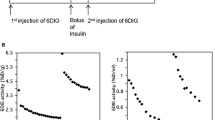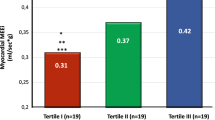Abstract
Purpose
The purpose of the research is to study the effect of acute inhibition of intravascular lipolysis on myocardial substrate selection during hypertriglyceridemia using in vivo radiotracer analysis and positron emission tomography.
Procedures
We induced acute hypertriglyceridemia in vivo using an intravenous infusion of Intralipid 20% (IL) without and with acute inhibition of fatty acid delivery from circulating triglycerides with injection of Triton WR-1339 (TRI) during a euglycemic–hyperinsulinemic clamp in Wistar rats. We determined the effect of TRI on myocardial uptake of circulating triglycerides and free fatty acids using intravenous injection of [3H]-triolein and [14C]-bromopalmitate, respectively. Myocardial blood flow, oxidative metabolism, and metabolic rate of glucose (MMRG) were determined using micro-positron emission tomography (μPET) with [13N]-ammonia, [11C]-acetate, and 2-deoxy-2-[F-18]fluoro-d-glucose (FDG).
Results
TRI reduced myocardial incorporation of [3H]-triolein but not [14C]-bromopalmitate showing that it selectively reduces myocardial fatty acid delivery from circulating triglycerides but not from free fatty acids. IL reduced myocardial blood flow and MMRG by 37% and 56%, respectively, but did not affect myocardial oxidative metabolism. TRI did not abolish the effect of IL on myocardial blood flow and MMRG.
Conclusions
Hypertriglyceridemia acutely reduces myocardial blood flow and MMRG in rats, but this effect is not explained by increased myocardial fatty acid delivery through intravascular triglyceride lipolysis.




Similar content being viewed by others
References
Carpentier AC (2008) Postprandial fatty acid metabolism in the development of lipotoxicity and type 2 diabetes. Diabetes Metab 34:97–107
Zhou YT, Grayburn P, Karim A, Shimabukuro M, Higa M, Baetens D, Orci L, Unger RH (2000) Lipotoxic heart disease in obese rats: implications for human obesity. Proc Natl Acad Sci USA 97:1784–1789
Chandler MP, Stanley WC, Morita H, Suzuki G, Roth BA, Blackburn B, Wolff A, Sabbah HN (2002) Short-term treatment with ranolazine improves mechanical efficiency in dogs with chronic heart failure. Circ Res 91:278–280
Nuutila P, Koivisto VA, Knuuti J, Ruotsalainen U, Teras M, Haaparanta M, Bergman J, Solin O, Voipio-Pulkki LM, Wegelius U (1992) Glucose-free fatty acid cycle operates in human heart and skeletal muscle in vivo. J Clin Invest 89:1767–1774
O’Brien KD, Ferguson M, Gordon D, Deeb SS, Chait A (1994) Lipoprotein lipase is produced by cardiac myocytes rather than interstitial cells in human myocardium. Arterioscler Thromb 14:1445–1451
Augustus AS, Kako Y, Yagyu H, Goldberg IJ (2003) Routes of FA delivery to cardiac muscle: modulation of lipoprotein lipolysis alters uptake of TG-derived FA. Am J Physiol Endocrinol Metab 284:E331–E339
Mardy K, Belke DD, Severson DL (2001) Chylomicron metabolism by the isolated perfused mouse heart. Am J Physiol Endocrinol Metab 281:E357–E364
Hauton D, Bennett MJ, Evans RD (2001) Utilisation of triacylglycerol and non-esterified fatty acid by the working rat heart: myocardial lipid substrate preference. Biochim Biophys Acta 1533:99–109
Augustus A, Yagyu H, Haemmerle G, Bensadoun A, Vikramadithyan RK, Park SY, Kim JK, Zechner R, Goldberg IJ (2004) Cardiac-specific knock-out of lipoprotein lipase alters plasma lipoprotein triglyceride metabolism and cardiac gene expression. J Biol Chem 279:25050–25057
Teusink B, Voshol PJ, Dahlmans VE, Rensen PC, Pijl H, Romijn JA, Havekes LM (2003) Contribution of fatty acids released from lipolysis of plasma triglycerides to total plasma fatty acid flux and tissue-specific fatty acid uptake. Diabetes 52:614–620
Augustus AS, Yagyu H, Haemmerle G, Bensadoun A, Vikramadithyan RK, Park SY, Kim JK, Zechner R, Goldberg IJ (2004) Cardiac-specific knockout of lipoprotein lipase alters plasma lipoprotein triglyceride metabolism and cardiac gene expression. J Biol Chem 279:25050–25057
Augustus AS, Buchanan J, Park TS, Hirata K, Noh HL, Sun J, Homma S, D’armiento J, Abel ED, Goldberg IJ (2006) Loss of lipoprotein lipase-derived fatty acids leads to increased cardiac glucose metabolism and heart dysfunction. J Biol Chem 281:8716–8723
Noh HL, Okajima K, Molkentin JD, Homma S, Goldberg IJ (2006) Acute lipoprotein lipase deletion in adult mice leads to dyslipidemia and cardiac dysfunction. Am J Physiol Endocrinol Metab 291:E755–E760
Yagyu H, Chen G, Yokoyama M, Hirata K, Augustus A, Kako Y, Seo T, Hu Y, Lutz EP, Merkel M, Bensadoun A, Homma S, Goldberg IJ (2003) Lipoprotein lipase (LpL) on the surface of cardiomyocytes increases lipid uptake and produces a cardiomyopathy. J Clin Invest 111:419–426
Pillutla P, Hwang YC, Augustus A, Yokoyama M, Yagyu H, Johnston TP, Kaneko M, Ramasamy R, Goldberg IJ (2005) Perfusion of hearts with triglyceride-rich particles reproduces the metabolic abnormalities in lipotoxic cardiomyopathy. Am J Physiol Endocrinol Metab 288:E1229–E1235
Ci X, Frisch F, Lavoie F, Germain P, Lecomte R, van Lier JE, Benard F, Carpentier AC (2006) The effect of insulin on the intracellular distribution of 14(R,S)-[(18)F]fluoro-6-thia-heptadecanoic acid in rats. Mol Imaging Biol 8:237–244
Taghibiglou C, Carpentier A, Rudy D, Aiton A, Lewis GF, Adeli K (2000) Mechanisms of hepatic VLDL overproduction in insulin resistance: evidence for enhanced lipoprotein assembly, reduced intracellular ApoB degradation, and increased microsomal triglyceride transfer protein in a fructose-fed hamster model. J Biol Chem 275:8416–8425, Ref Type: Journal (Full)
Carpentier A, Frisch F, Cyr D, Genereux P, Patterson BW, Giguere R, Baillargeon JP (2005) On the suppression of plasma non-esterified fatty acids by insulin during enhanced intravascular lipolysis in humans. Am J Physiol Endocrinol Metab 289:E849–E856
Lecomte R, Cadorette J, Rodrigue S, Lapointe D, Rouleau D, Bentourkia M, Yao R, Msaki P (1996) Initial results from the Sherbrooke avalanche photodiode positron tomograph. IEEE Trans Nucl Sci 43:1952–1957
Chen BC, Huang SC, Germano G, Kuhle W, Hawkins RA, Buxton D, Brunken RC, Schelbert HR, Phelps ME (1991) Noninvasive quantification of hepatic arterial blood flow with nitrogen-13-ammonia and dynamic positron emission tomography [see comments]. J Nucl Med 32:2199–2206
Nitzsche EU, Choi Y, Czernin J, Hoh CK, Huang SC, Schelbert HR (1996) Noninvasive quantification of myocardial blood flow in humans. A direct comparison of the [13N]ammonia and the [15O]water techniques. Circulation 93:2000–2006
Ng CK, Huang SC, Schelbert HR, Buxton DB (1994) Validation of a model for [1–11C]acetate as a tracer of cardiac oxidative metabolism. Am J Physiol 266:H1304–H1315
Bentourkia M, Croteau E, Langlois R, Aliaga A, Cadorette J, Bénard F, Lesur O, Lecomte R (2002) Cardiac studies in rats with [11C]acetate and PET: a comparison with [13N]Ammonia. IEEE Trans Nucl Sci 49:2322–2327
Lecomte R, Croteau E, Gauthier ME, Archambault M, Aliaga A, Rousseau J, Cadorette J, Leroux JD, Lepage MD, Bénard F, Bentourkia M (2004) Cardiac PET imaging of blood flow, metabolism and function in normal and infarcted rats. IEEE Trans Nucl Sci 51:696–704
Takala TO, Nuutila P, Pulkki K, Oikonen V, Gronroos T, Savunen T, Vahasilta T, Luotolahti M, Kallajoki M, Bergman J, Forsback S, Knuuti J (2002) 14(R, S)-[(18)F]Fluoro-6-thia-heptadecanoic acid as a tracer of free fatty acid uptake and oxidation in myocardium and skeletal muscle. Eur J Nucl Med Mol Imaging 29:1617–1622
Bentourkia M (2003) PET kinetic modeling of 11C-acetate from projections. Comput Med Imaging Graph 27:373–379
Croteau E, Benard F, Bentourkia M, Rousseau J, Paquette M, Lecomte R (2004) Quantitative myocardial perfusion and coronary reserve in rats with 13N-ammonia and small animal PET: impact of anesthesia and pharmacologic stress agents. J Nucl Med 45:1924–1930
Sokoloff L, Reivich M, Kennedy C, Des Rosiers MH, Patlak CS, Pettigrew KD, Sakurada O, Shinohara M (1977) The [14C]deoxyglucose method for the measurement of local cerebral glucose utilization: theory, procedure, and normal values in the conscious and anesthetized albino rat. J Neurochem 28:897–916
Krivokapich J, Huang SC, Selin CE, Phelps ME (1987) Fluorodeoxyglucose rate constants, lumped constant, and glucose metabolic rate in rabbit heart. Am J Physiol 252:H777–H787
Vettor R, Fabris R, Serra R, Lombardi AM, Tonello C, Granzotto M, Marzolo MO, Carruba MO, Ricquier D, Federspil G, Nisoli E (2002) Changes in FAT/CD36, UCP2, UCP3 and GLUT4 gene expression during lipid infusion in rat skeletal and heart muscle. Int J Obes Relat Metab Disord 26:838–847
Liedtke AJ, Nellis SH, Mjos OD (1984) Effects of reducing fatty acid metabolism on mechanical function in regionally ischemic hearts. Am J Physiol 247:H387–H394
Prinzen FW, Van der Vusse GJ, Coumans WA, Kruger R, Verlaan CW, Reneman RS (1981) The effect of elevated arterial free fatty acid concentrations on hemodynamics and myocardial metabolism and blood flow during ischemia. Basic Res Cardiol 76:197–210
Rim SJ, Leong-Poi H, Lindner JR, Wei K, Fisher NG, Kaul S (2001) Decrease in coronary blood flow reserve during hyperlipidemia is secondary to an increase in blood viscosity. Circulation 104:2704–2709
Esenabhalu VE, Cerimagic M, Malli R, Osibow K, Levak-Frank S, Frieden M, Sattler W, Kostner GM, Zechner R, Graier WF (2002) Tissue-specific expression of human lipoprotein lipase in the vascular system affects vascular reactivity in transgenic mice. Br J Pharmacol 135:143–154
Brown MA, Myears DW, Bergmann SR (1989) Validity of estimates of myocardial oxidative metabolism with carbon-11 acetate and positron emission tomography despite altered patterns of substrate utilization. J Nucl Med 30:187–193
Sambandam N, Abrahani MA, St Pierre E, Al Atar O, Cam MC, Rodrigues B (1999) Localization of lipoprotein lipase in the diabetic heart: regulation by acute changes in insulin. Arterioscler Thromb Vasc Biol 19:1526–1534
Neitzel AS, Carley AN, Severson DL (2003) Chylomicron and palmitate metabolism by perfused hearts from diabetic mice. Am J Physiol Endocrinol Metab 284:E357–E365
Ruge T, Wu G, Olivecrona T, Olivecrona G (2004) Nutritional regulation of lipoprotein lipase in mice. Int J Biochem Cell Biol 36:320–329
Nelson RH, Prasad A, Lerman A, Miles JM (2007) Myocardial uptake of circulating triglycerides in nondiabetic patients with heart disease. Diabetes 56:527–530
Acknowledgements
A.C.C. was supported by a Junior 2 Scholarship from the Fonds de la recherche en santé du Québec (FRSQ). The Centre de recherche clinique Etienne-Le Bel is a FRSQ-funded research centre. This work was supported by grants from Association Diabète Québec, from the Heart and Stroke Foundation of Canada (the Jonathan-Ballon Award), and from the Canadian Institutes of Health Research (MOP 53094 and MOP 15348).
Author information
Authors and Affiliations
Corresponding author
Rights and permissions
About this article
Cite this article
Ménard, S.L., Ci, X., Frisch, F. et al. Mechanism of Reduced Myocardial Glucose Utilization During Acute Hypertriglyceridemia in Rats. Mol Imaging Biol 11, 6–14 (2009). https://doi.org/10.1007/s11307-008-0171-2
Received:
Revised:
Accepted:
Published:
Issue Date:
DOI: https://doi.org/10.1007/s11307-008-0171-2




